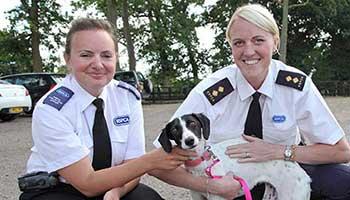One dog abused every hour: cruelty to dogs on the rise
25.08.23
The number of reports the animal charity has received about intentional harm to dogs has risen since 2020.
In 2022, there were 9,776 reports made to the RSPCA about intentional harm to dogs, compared with 8,176 in 2021 and 7,691 in 2020. That's a rise of 27% in just three years.
This means in 2022, a staggering 27 dogs a day were cruelly treated - more than one every hour.
The type of incidents that come under intentional harm are attempted killing, poisoning, beating, improper killing, mutilation and suspicious circumstances.
Overall, the number of reports made to the RSPCA about dogs - including intentional harm, neglect and abandonments - in 2022 was 42,690, a 7% increase from 2021 (39,797).
In summer months cases of cruelty rise and the charity is braced for its busiest time of the year.
The charity has released the heartbreaking figures as part of its Cancel Out Cruelty campaign, in a bid to raise funds to help its frontline rescue teams continue to save animals from cruelty and abuse.
Dog lover, Dermot Murphy, who heads up the RSPCA's frontline rescue officers, said: "For hundreds of years dogs have been known as man's best friend - and if you share your home with one, you will know why, as they are so loyal and loving companions.
"But these awful statistics tell a different story. Dogs are the most abused animal in this country and we investigate more complaints about them than any other type of animal - 27 dogs a day are cruelly treated - one every hour.
"Everyone who cares about animals will be sickened to know that during the summer rise in cruelty that on average there is a report every hour of a dog being kicked, beaten, burned or worse. We need the public's help to Cancel Out Cruelty. Their donations, no matter how small, help keep our frontline officers out on the road rescuing animals and investigating these terrible reports.
Dog beaten so badly vet staff thought he had died
He was rushed to Hull PDSA Animal Hospital by a member of the public. Staff initially thought the pet, wrapped in a blanket, had already died as he was in a collapsed state and unresponsive - but then they spotted shallow breathing and rushed into action to help save his life.
The vet found he had bruising to the white of his left eye and bruising to his upper and lower lips. Three of his upper incisors were missing and another tooth was broken.
Vet nurse Rachel Coombes, who was on shift when Terry was brought in, was so upset about the state of his suffering that she said to colleagues: "If he survives this I will adopt him."
Terry was placed in an oxygen tent to assist his breathing and was also put on a special heat mat as he was found to be in a hypothermic state.
He was then put on an intravenous drip and the emergency veterinary treatment continued until his vital organs had normalised and he regained consciousness.
An x-ray was taken which revealed that fortunately Terry did not have a fractured skull, but his injuries were consistent with being hit.
Due to the suspicious nature of his injuries the RSPCA were called to investigate. Inspector Laura Barber traced the owner of the pup and police were able to place him in the care of the RSPCA.
Thankfully he returned to full health and was happily adopted by Rachel.
Inspector Barber said: "He was in such a sad state and was really quiet and withdrawn when he was with people. I always remember him though coming over to me and putting his head on me and being so trusting. He was so loveable and it is great to see he has the home he deserves with such a lovely family."
The RSPCA is highlighting Terry's plight as part of the charity's Cancel Out Cruelty campaign - after latest figures showing the charity saw a 22% increase in reports of beatings in 2022 (9,658 in 2022, compared to 7,857 in 2021).
The figures released by the RSPCA also shows:
In 2022 the charity saw a 22% increase in reports of beatings (9,658 in 2022, compared to 7,857 in 2021)
The number of beatings reported to the RSPCA in 2022 peaked in August, when 1,081 reports were received - a staggering 35 a day
The number of animals killed in ‘suspicious circumstances' increased in 2022 by 15% from by 2021 (891 in 2022, compared to 775 in 2021)
77% of all cruelty complaints reported to the charity 2022 were beatings
'Animal cruelty happening on a massive scale'
Dermot Murphy, RSPCA inspectorate commissioner, said: "Right now, animal cruelty is happening in England and Wales on a massive scale and rising. It is heartbreaking that we are seeing such sad figures which show animal cruelty is, very sadly, on the rise.
"While we don't know for certain why there has been an increase, the cost of living crisis and the post-pandemic world we live in has created an animal welfare crisis.
"Each year, these reports reach its terrible annual peak in the summer months – when an animal is beaten on average every hour of every day. The cost-of-living crisis also means the cost of rescuing animals is at an all-time high and our vital services are stretched to the limit."
As the only charity in England and Wales investigating cruelty and rescuing animals, the RSPCA needs support to stay out on the frontline:
- £2 could help to provide a meal for a cat or dog in our care
- £6 could help pay to feed a dog for a day in our care
- £10 could help pay towards bandages for a cat or dog
- £15 could help pay for a cat or dog's clinical exam
- £20 could help pay towards a bird catching kit
- £30 could help pay for a life jacket for an inspector
- £100 could help pay towards water rescue equipment
- £500 could kit out a 4x4 inspector van
The RSPCA's frontline teams are working hard to rescue animals in need this summer but we can't do it alone - we need your help to Cancel Out Cruelty. To help support the RSPCA, visit: www.rspca.org.uk/cruelty


